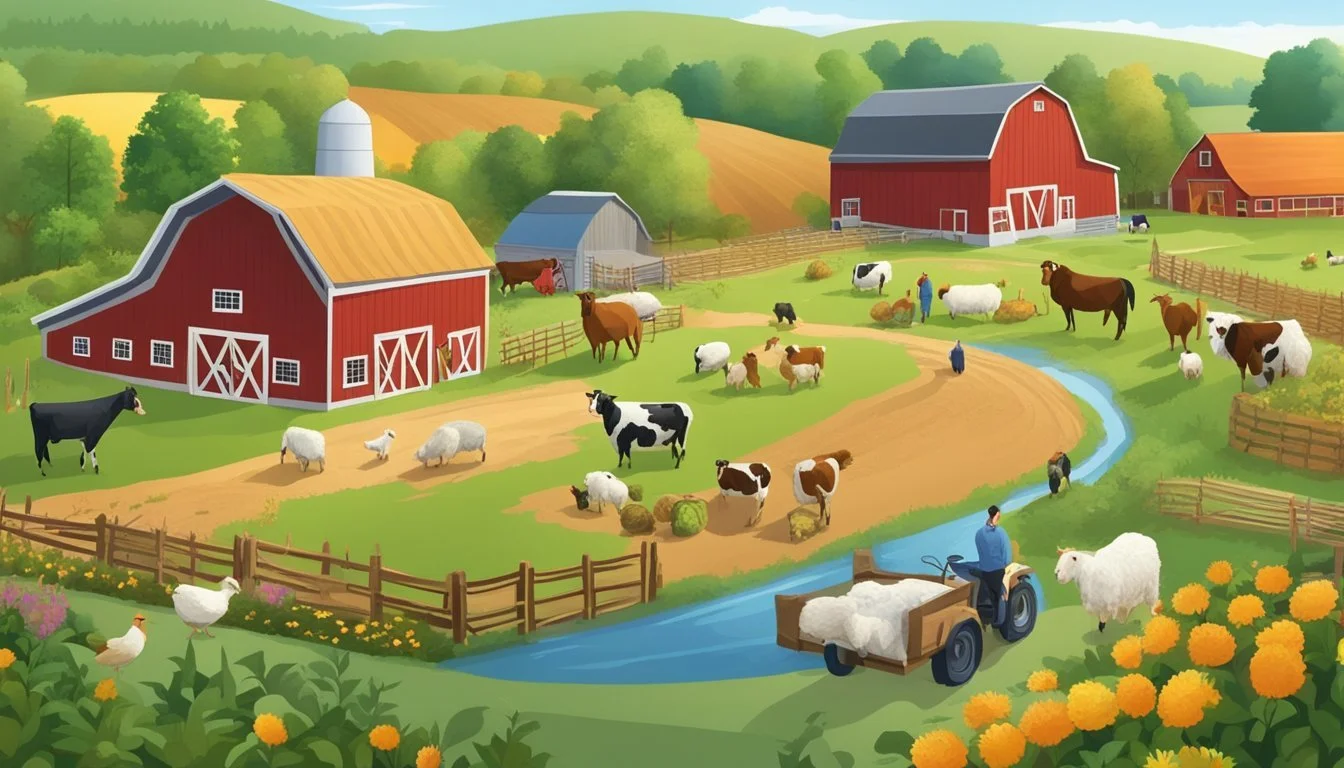Agritourism in Kansas
Exploring the Sunflower State's Rural Charm
Agritourism in Kansas serves as a bridge connecting the rich agricultural heritage of the state with the growing interest in rural lifestyle and farm activities among tourists. This fusion of agriculture and tourism has given rise to opportunities for visitors to immerse themselves in the farm-to-table experience and learn about the agricultural processes firsthand. With a vast expanse of farmland, diverse agricultural activities, and a welcoming rural community, Kansas offers a unique canvas for agritourism. Visitors can engage in a variety of experiences, from picking sunflowers and navigating corn mazes to tasting locally produced wines and cheeses, all while contributing to the local economy and gaining a deeper appreciation for the state's agricultural roots.
The state fosters this agricultural engagement through a framework that supports local producers in tailoring their operations towards tourism. This not only enhances the visibility of Kansas's agricultural prowess but also provides educational experiences for families, school groups, and individuals interested in understanding where their food comes from. Whether it's a leisurely day spent at a working farm, a ranch visit to see cattle grazing, or a retreat to a rural lodge, each encounter with Kansas agritourism is designed to support local producers and offer genuine insights into the state's farming practices and rural life.
Deliberate efforts by the Kansas Department of Wildlife, Parks and Tourism further streamline the process of connecting tourists with agritourism experiences. The department helps visitors discover experiences tailored to their interests, while registered agritourism programs ensure that businesses meet specific standards, thereby guaranteeing authentic and quality experiences. Such initiatives exemplify Kansas's commitment to promoting agritourism as a means of preserving the agricultural way of life and showcasing it to the world.
Overview of Agritourism in Kansas
Agritourism in Kansas merges the time-honored traditions of farming and ranching with the business of tourism, providing additional revenue for producers and offering tourists an authentic rural experience.
Defining Agritourism
Agritourism is an innovative industry where agriculture and tourism intersect, resulting in benefits such as increased income for Kansas agricultural producers and enriched experiences for visitors. It involves activities carried out on a farm, ranch, or other agricultural establishments that are open to the public for enjoyment, education, or active involvement in the operations. Visitors engage directly with farming tasks, rural lifestyle, and the local culture, often taking part in hands-on activities like picking fruits, feeding animals, or hayrides.
Economic Impact of Agritourism on Kansas
The agritourism industry stands as a significant contributor to the Kansas economy. It not only diversifies the income for those involved in Kansas agriculture but also helps in preserving the agricultural heritage and rural way of life. The infusion of tourism revenue into rural communities supports local businesses and can lead to job creation. Agritourism provides an alternative revenue stream for farmers and ranchers, enabling them to maintain and grow their operations amidst fluctuating market conditions.
Types of Agritourism Attractions
Agritourism in Kansas provides visitors with a variety of authentic experiences ranging from hands-on agricultural activities to indulging in the local produce. These attractions give tourists a glimpse into the agricultural life and the opportunity to actively participate in it.
Farms and Ranches
Kansas farms and ranches offer guests a chance to immerse themselves in the day-to-day operations of a working farm. Visitors can engage in a multitude of activities such as animal petting, hayrides, and educational tours that highlight the importance of agriculture in the state. Ranches may also showcase cattle herding and provide insights into cattle care.
Wineries and Vineyards
Vineyards and wineries in Kansas are known for their quality and charm. Guests can tour the vineyards to learn about the winemaking process from the ground up and participate in wine tastings. Some wineries may also host seasonal events or offer picturesque venues for gatherings.
U-Pick Gardens
U-Pick gardens are a delight for those who enjoy the freshness of hand-picked fruits and vegetables. These venues allow you to select and harvest your own produce, including seasonal specialties like sunflowers. This immersive experience connects visitors directly with the source of their food.
Farmers' Markets
Farmers' markets are essential for connecting consumers with local farmers. These markets often feature fresh, locally-grown produce, artisanal products, and sometimes live entertainment. Here, farmers can interact with visitors, educating them about the produce and the joys and challenges of farm life.
Agritourism Activities
Agritourism in Kansas offers a variety of immersive activities for visitors to engage with the agricultural community. These activities provide firsthand experiences of farm life, educational insights, and outdoor adventures specific to the region.
Guided Farm Tours
Kansas agritourism thrives with guided farm tours, giving guests a closer look at the daily operations of working farms and ranches. Visitors can explore vast wheat fields, observe cattle grazing, and even participate in harvests. Tours often include demonstrations of farm machinery and discussions about sustainable farming practices.
Educational Workshops
Educational workshops serve as a cornerstone of Kansas agritourism, offering learning experiences that range from winemaking at local vineyards to conservation techniques practiced on the farms. Participants can engage in hands-on activities, such as cheese-making or beekeeping, gaining knowledge applicable to both rural and urban settings.
Outdoor Recreation
Kansas agritourism isn't limited to farm activities; many agricultural operations integrate outdoor recreation into their offerings. Visitors can enjoy bird watching in native prairies, horseback riding on trails, or fishing in well-stocked ponds. Outfitters may also provide guided nature walks highlighting the state's diverse ecosystems.
Special Events
Throughout the year, Kansas agricultural operations host various special events that celebrate the state's farming heritage. These events can range from farm-to-table dinners and wine tastings at local vineyards to seasonal festivals centered around harvests or holidays. These experiences aim to connect visitors with the agricultural community while showcasing Kansas' unique culture and produce.
Benefits of Agritourism for Kansas Producers
Agritourism presents Kansas agricultural producers with opportunities to diversify their revenue while offering authentic farm experiences. These activities not only contribute to the state's economy but also allow producers to forge stronger connections with the community.
Diversifying Income Streams
Kansas farmers and ranchers can boost their income significantly by incorporating agritourism into their operations. Opening their doors to tourists for experiences such as pumpkin picking, hayrides, or wine tasting, Kansas producers are able to generate additional revenue streams. This helps mitigate the financial risk of relying solely on traditional agricultural income.
Farm experience: Visitors pay for authentic experiences.
Revenue: Seasonal activities provide financial benefits.
Connecting with the Community
Agritourism allows Kansas producers to establish a deeper connection with the community. Hosting visitors on their farms and ranches enables producers to showcase their way of life and to create lifelong memories for their guests. These experiences foster community support for local agriculture and can inspire a new appreciation for where food comes from.
Community events
Farm-to-table dinners
Education and Awareness
Beyond entertainment, agritourism serves as an educational platform where agricultural producers can raise awareness about farming practices and the importance of agriculture to Kansas's heritage. Visitors leave with a greater understanding of the agricultural process and the challenges faced by producers.
Educational tours
Hands-on farming activities
Legal and Regulatory Aspects
In Kansas, the development and operation of agritourism businesses are influenced by specific legislation and compliance requirements that are critical for legal operation. Entities must navigate federal, state, and local regulations to ensure they meet all legal obligations.
Kansas Agritourism Promotion Act
The Kansas Agritourism Promotion Act was established in 2004 to support the growth and viability of the agritourism industry within the state. Its key focus is to enhance the promotion of agritourism businesses in conjunction with Kansas Tourism initiatives. The Act provides benefits such as promotional assistance through state resources and aims to reduce some of the barriers to entry for new enterprises.
Registration and Compliance
Agritourism businesses in Kansas are required to register with the state. Specifically, the Kansas Department of Wildlife, Parks and Tourism categorizes a "Registered agritourism operator" as one who actively offers agritourism activities and complies with registration requirements pursuant to K.S.A. 32-1433. To maintain valid registration, businesses must adhere to all relevant local, state, and federal regulatory requirements.
Compliance Checklist:
Local Planning: Consult local planning authorities for business development laws.
KDA Licensing: Secure necessary licenses from the Kansas Department of Agriculture.
Federal Regulations: Meet any applicable federal government agency requirements.
Liability and Insurance
For registered agritourism operators, managing liability and maintaining appropriate insurance coverage are essential practices. Operators should be aware of legal protections provided under the Act but also recognize the importance of carrying insurance that covers the unique risks associated with agritourism. Visitors' safety is paramount, and mitigation of risks through both operational planning and insurance safeguards is advised.
Key Insurance Considerations:
Public Liability: Protection against injuries or accidents on the premises.
Property Coverage: Insurance for damages to the property or assets.
Activity Risks: Specific policies covering the particular agritourism activities offered.
This framework lays out the groundwork for running an agritourism business in Kansas, encompassing vital legislation, the necessity for compliance, and the intricacies of liability coverage. Proper adherence to these guidelines is critical for registered companies operating within the agritourism industry.
Planning Your Agritourism Visit
When visiting Kansas for agritourism, potential visitors can expect a blend of authentic farm experiences and comfortable lodging. The state offers a diverse array of activities that cater to individuals and families looking for an immersive rural experience.
Finding Registered Agritourism Locations
Kansas takes pride in its certified agritourism businesses that combine agriculture with tourism to offer visitors unique experiences. Prospective visitors can start their journey by exploring the travelks.com website for a comprehensive list of certified agritourism locations. These locations provide opportunities to engage in hands-on activities such as u-pick farms, where visitors can pick their own fruits and vegetables, and farms that offer tours of their operations.
Whispering Elm Farm in Paola is one example of a location where visitors can experience rural life firsthand.
Prairiewood Retreat & Preserve offers a different aspect of agritourism with its unique lodging facilities.
Accommodations and Lodging
Lodging options vary from traditional hotels to distinctive stays like those at Prairiewood Retreat. When planning accommodations in Kansas, visitors should consider:
Staying overnight at a local farm or a ranch, which are often family-friendly and provide a deeper insight into agricultural life.
Exploring various vineyards and wineries in the region, which may offer lodge facilities.
Type of Lodging Description Farm Stays Immerse in the lifestyle of a working farm or ranch. Vineyard Lodges Taste the regional flavors while staying on-site. Rural Retreats Experience tranquility away from urban hustle.
Seasonal Considerations
Timing is crucial for planning an agritourism visit to Kansas. Different seasons offer various activities:
Spring is perfect for bird watching activities, including the grand display at prairie chicken leks.
Summer and Fall are popular for u-pick farm activities, as this is the period for harvesting.
During hunt seasons, farms often gear up for hunting and fishing excursions.
For the best experience, visitors should check the seasonal availability of these activities to coincide with the prime time for their interests.
Promoting Agritourism in Kansas
Promoting agritourism in Kansas involves strategic marketing, fostering partnerships with agricultural entities, and creating unique and memorable experiences for visitors.
Marketing Strategies
Agritourism entities must utilize targeted marketing strategies to attract tourists interested in food, shopping, dining, and authentic rural experiences. Effective strategies include:
Developing an Online Presence: A robust online strategy, including a user-friendly website and active social media profiles, is essential for showcasing the diverse agritourism opportunities in Kansas.
Print and Media Advertising: Local publications, radio, and television can be used to reach potential visitors within the region, emphasizing the hospitality and community spirit found in Kansas.
Networking with Agricultural Entities
Building a network with other agricultural businesses can strengthen the agritourism sector's appeal. Key facets of networking are:
Collaboration with Farms: Establishing connections with places like Heartland Farm, operated by the Dominican Sisters of Peace, not only provides additional attractions but also showcases the passion behind Kansas agritourism.
Partnerships with Tourism Boards: Aligning with local tourism authorities can enhance visibility for agritourism businesses and promote a cohesive community.
Creating Memorable Experiences
To ensure visitors leave with lasting memories, Kansas agricultural venues focus on:
Host Interactive Activities: Farms offer hands-on experiences, such as fruit picking or farm-to-table dinners, delivering authenticity and engaging visitors in the rural lifestyle.
Exceptional Hospitality: Kansas agritourism is known for its warm hospitality, essential for creating personal connections and encouraging repeat visits.
Agritourism Success Stories
Kansas agritourism conveys its success through expansive ranch experiences, educational farm-to-table programs, and engaging farm tours. Visitors often look for authentic connections to food production and livestock management, a niche Kansas agritourism fulfills proficiently.
Award-Winning Agribusinesses
Manhattan, Kansas, is often lauded for its integration of agricultural and touristic endeavors. The Kaw Valley Farm Tour stands out as an innovative annual event, allowing visitors to explore a variety of farms and witness sustainable agricultural practices. Highlights of the tour include:
Interaction with farm animals: Tourists can get up close with chickens, cattle, and other livestock.
Demonstrations of crop management: Corn, soybeans, and sunflower fields display Kansas's agricultural diversity.
Businesses participating in the tour have received recognition for both preserving local farming traditions and adapting to the interests of modern tourists.
Innovative Farming Practices
Ranching and farming in Kansas have embraced modernity without relinquishing tradition. Many ranches offer hands-on experiences that blend learning with entertainment. A case in point is the integration of farm-to-table activities where visitors participate in:
Harvesting: Picking fresh produce directly from the field.
Preparation and tasting: Engaging in cooking demonstrations and enjoying fresh meals.
Ranch experiences in the state provide opportunities to not only observe but partake in the daily routines of a working farm, including cattle drives and livestock care, all designed to educate and inspire a new generation about the importance of agriculture.
Future Outlook of Agritourism
Agritourism in Kansas presents a notable opportunity for agricultural producers to diversify and strengthen their income streams. As the sector grows, it indicates a positive trend, leveraging the state's vast agricultural heritage. The implication is especially significant for rural communities, where this model supports economic sustainability and job creation.
Trends in Agritourism:
A rise in demand for educational experiences on farms.
Increased interest in rural culture and lifestyle.
Growing popularity of activities like corn mazes, which blend agriculture with entertainment.
Economic Impact:
The industry's trajectory suggests potential growth, with agritourism revenue increasing notably from 2012 to 2017.
Agritourism's contribution to farm-related income has shown to be substantial.
Projected Developments:
Expansion of agritourism facilities that offer overnight stays and dining.
Enhanced agritourism marketing practices to elevate consumer engagement.
Strategic incorporation of digital tools to streamline the visitor experience.
Potential Challenges for Producers:
Balancing traditional agriculture with the demands of tourism.
Ensuring a consistent, quality experience for tourists amid seasonal fluctuations in farm activities.
Agritourism Activities:
Row Crops: Integration within agritourism as educational tools.
Corn Mazes: Expected to remain popular attractions, embodying both entertainment and agricultural education.
Given the sector’s direction, stakeholders appear optimistic about the prospects of agritourism in Kansas. Continuous adaptation and innovation in activities offered, such as integrating row crops into educational experiences and diversifying attractions, like corn mazes, will be crucial for sustaining interest and driving future growth.
Resources and Further Reading
To gain a deeper understanding of agritourism in Kansas, various resources are available for readers to explore:
State Resources:
Kansas Department of Agriculture
Their Agritourism Destination Licensing Guide is essential for businesses looking to navigate the regulations of agritourism. Contact details: 1320 Research Park Drive, Manhattan, KS 66502, Phone: (785) 564-6700, Email, Website.
Publications:
Kansas Agritourism Manual
Published on Issuu, this manual is a must-read for insights into growing agritourism businesses in the state.
Associations:
Kansas Agritourism
A pivotal organization where tourism meets agriculture, offering practical experiences for visitors on farms, ranches, and wineries across Kansas.
Academic Contributions:
"AGRITOURISM IN KANSAS: Zachary Ward Thorp"
A scholarly survey discussing agritourism providers in Kansas with analytical gravity models that help in understanding the business dynamics.
Online Resources:
Kansas Farm Food
Features engaging stories and valuable information about the diverse agritourism activities in Kansas, from vineyards and livestock farms to recreational activities like hunting and bird watching.
For visitors looking to experience Kansas's rural lifestyle firsthand, these resources serve as a comprehensive guide. They offer invaluable details for both agricultural producers and tourists interested in exploring the intersection of tourism and agriculture within the Sunflower State.









